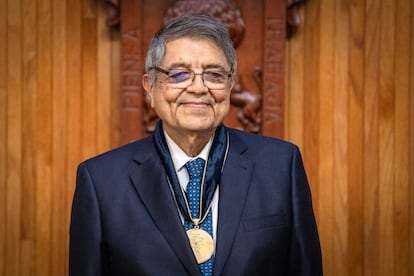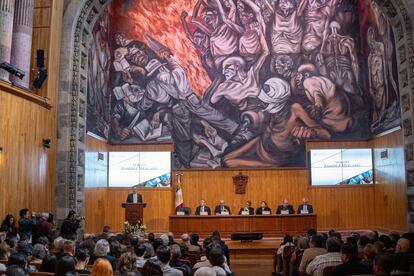The Nicaraguan writer Sergio Ramírez accepted this Wednesday the honorary doctorate awarded to him by the University of Guadalajara, in Mexico, with a vindication of the writers who have had to go into exile due to the persecution of tyrannies and dictatorships. That boy born in Masatepe, a small town in the Central American country, who at the age of six wrote stories with chalk on the floor of his parents’ store, is part of the list of creators who have had to launch themselves beyond the seas to escape the prison, repression and the silence of despots. “The low power puts a price on the heads of writers,” he stated in a moving speech in which he said, however: “No one can exile me from my language.”
Ramírez, who was a staunch opponent of the Somoza dictatorship, got involved in the Sandinista movement to make the revolution, was vice president of revolutionary Nicaragua and candidate for the Presidency in the nineties of the last century, has made a public mea culpa. “I was a bad politician,” he said. “Utopias become dystopias.” Ramírez has asked, therefore, not to be remembered as a politician. “It seems that the time is coming when one must ask oneself about the way in which one would like to be remembered; I have no doubt in answering myself that I would like to be, first of all, as a writer,” stated the author of Divine Punishment.
The beautiful auditorium of the University of Guadalajara, decorated with murals by José Clemente Orozco, was the venue for a moving and warm ceremony in which the academic authorities have named Ramírez as one of that house of studies that year after year organizes the International Book Fair (FIL). Francisco González Madariaga, rector of arts at the university, has been in charge of introducing the Nicaraguan, whose nationality was taken away by the Daniel Ortega regime and the justice system under his command condemned him for “treason to the country” and forced him into exile, in Spain. Ramírez, he said, did not succumb to power, he turned his back on it to put freedom before him. The academic stated that authoritarianism is not compatible with literary production and that the Central American represents the biography of those who have acted accordingly. “Sergio believes in the future, because he comes from the path of tyranny,” said González Madariaga.
The outgoing rector of the university, Ricardo Villanueva, recalled that Ramírez is already part of the personalities that his academy has recognized with the highest honor, among them three Nobel Prize winners in Literature, the Peruvian Mario Vargas Llosa and the Colombian Gabriel García Márquez , as well as the Mexican Carlos Fuentes. It was this writer who in the last decade of the eighties stated in this newspaper that with Divine Punishment Ramírez had written “the great Central American novel.” The Nicaraguan has also been awarded the Alfaguara Prize for his work Margarita, the sea is beautifulwhich rescues a verse by Rubén Darío, the greatest writer originally from that Central American country. Darío did not go into exile persecuted by dictatorships, but he did live long periods away from his country to find his destiny, to grow as a poet. His compatriot, however, has packed his suitcase without the clear idea of returning to the tropical country of enormous lakes and shaggy jungles that is the setting of his novels and stories.
Ramírez has said about his exile: “Some time ago, by chance, I found the keys to my house in Managua in the lining of a suitcase. I had put them in my pocket, as always, that morning when Tulita (Gertrudis, his wife) and I left for the airport without knowing that, when the door closed behind us, we would never cross the threshold again. And he added: “I remembered then, when I had them again in my hand, the Jews of Sefarad banished in 1492 from Spain by decree of the Catholic kings, and whose descendants, centuries later, are preserved in Thessaloniki, in Istanbul, in Jerusalem, the keys to the houses of their ancestors.”
And he made reference to a story that Manuel Vicent tells in The Key, of 2014: “That of the amber merchant whom he met in a market in Istanbul: ‘He had made several trips to Spain with the key to a door that was only in his dreams. The door did not exist, but he thought that, perhaps, the lock could be in the hands of some dealer.’ Until, ‘among the odds and ends of a market run by a gypsy from Plasencia, he found a rusty lock from the 15th century in which his key fit and worked perfectly.’ And he said, ‘This is how destiny opens and closes.’ A kept key opens and closes destiny, and an open suitcase also means the uncertainties and hopes of destiny that weighs on every exile. Uncertainty, regret, nostalgia, hope, which are the marks of the impossibility of returning to the homeland. When we left Managua that May morning three years ago, each of us carried, as always, a single suitcase, and those suitcases still remain unclosed. The open suitcase syndrome denounces the exile who is not resigned to staying, and always hopes to return. “To be passing through is to always be hopeful of returning.”

In his speech, the writer recalled dozens of creators who have had to leave their countries due to dictatorships or the whims of absolute rulers. He remembered Victor Hugo: “Forced to flee France by the tyranny of ‘Napoleon the Little’, as he called Louis Napoleon Bonaparte, and exiled he wrote Les Miserables on the island of Guernsey, in the English Channel. The secret police circular that forced Hugo into exile, dated December 3, 1851, read: “Today, at six o’clock, twenty-five thousand francs will be offered to anyone who arrests or murders Hugo. They know where it is. “Do not let him escape under any pretext.” He remembered Ovid, “banished by the Emperor Augustus to the most inhospitable confines of the Roman Empire.” To Haroldo Conti, kidnapped and disappeared at the hands of the dictatorship of General Videla in Argentina, in 1976; to Rodolfo Walsh, murdered in Buenos Aires in 1977 by the same dictatorship after publishing his Open letter from a writer to the Military Junta; mentioned the exile of the Venezuelan Rómulo Gallegos, author of Mrs. Barbarafirst under the dictatorship of Juan Vicente Gómez and then under that of Marcos Pérez Jiménez: to the short story writer Juan Bosch, exiled by the dictatorship of Generalissimo Rafael Leónidas Trujillo in the Dominican Republic; to Pablo Neruda, who had to flee Chile under the Government of Gabriel González Videla, whom he had supported.
Ramírez has stated that “in Latin America a high price has always been paid for free speech. The noise of gunshots to drown out the words. The silence of the dungeons. The clandestine cemeteries. Death, disappearance, prison, exile.” This is said by the man who, like hundreds of Nicaraguans, has left the country due to the tyrannical hand of Ortega, the revolutionary turned dictator. A new family dictatorship. Writers, journalists, intellectuals, musicians. Ramírez, Gioconda Belli, the journalist Carlos Fernando Chamorro, the feminist Sofía Montenegro, all condemned to exile and banished, their assets confiscated and their works prohibited.
That fear accompanies him. He also recalled the story of Sandor Marais, who “felt like he had died” when his books, which then could only be read in Hungarian, were also banned in his homeland. “They removed his voice as punishment. Not only could no one read it on the other side of the border, not even in Poland, or in Austria, where it was not translated, but it could not be read in their own country either. Like it didn’t exist. And he committed suicide in exile, already without a tongue,” he narrated. “Nicaragua is a smaller country than Sandor Marais’ Hungary, and that is why it intrigues and terrifies me, that possibility that no one could hear me beyond my borders, or that I would ever be left without a language. The limbo of words, or its hell. But I, with my tongue, travel an entire continent, cross the sea, and I will always let myself be heard. And if my books are banned in Nicaragua, the clandestine paths of social networks make them reach my fellow readers, just as happened before with the books registered on the black lists of the inquisition, which were smuggled across the borders on the back of a mule. , or they evaded customs, hiding in barrels of wine, or bacon.

The Nicaraguan belongs “to that long tradition of those who pay a price for their words,” but he stated in a auditorium full of an audience devoted to his story: “There is something that no one can ever exile me from, and it is my own language.” . Because my language of writing realities and creating imaginary worlds is a language that knows no borders.” The language of Ramírez, the boy who wrote stories with chalk on the floor of his parents’ store in his native Masatepe, is still alive despite the chains of the dictatorship that wants to silence him.

